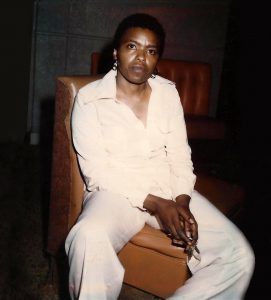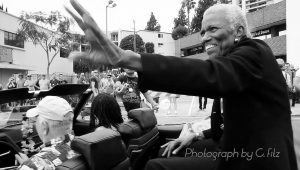

By Ali Dopp
Jewel Thais-Williams is a civil rights leader, healer and was the owner of Jewel’s Catch One, the LA nightclub known as the Studio 54 of the West. In 1973 Thais-Williams opened the doors of Catch One, amid racism and homophobia, to create a space where everyone was welcome. The nightclub provided people of color, the LGBTQ community and even celebrities – like Madonna, Sharon Stone and Thelma Houston – a place to come, dance and be themselves for more than 42 years before closing in 2015.
This vibrant nightclub is the backdrop of director C. Fitz’s documentary Jewel’s Catch One, screening at Portland’s QDoc, May 19, which chronicles the largely undocumented work of Thais-Williams. Fitz says the film is about “a legendary nightclub and more importantly, seeing history through the pioneer’s eyes – Jewel Thais-Williams. And seeing how she built not only a club – and later a clinic – but a community, that helped thousands and that also transformed history for us and helped our future.”
 Thais-Williams started Catch One in the ‘70s as a recession proof business that met a community need. “It was just at the beginning of a sexual revolution and so the resistance against that revolution led to heightened homophobia. The clubs that did exist were either little juke joints or they were in areas of town where they didn’t want people of color, nor women, to frequent them….So it was I guess for my own sake, as much as others, to find a place.” And that’s what Thais-Williams did. She created a disco and everyone came.
Thais-Williams started Catch One in the ‘70s as a recession proof business that met a community need. “It was just at the beginning of a sexual revolution and so the resistance against that revolution led to heightened homophobia. The clubs that did exist were either little juke joints or they were in areas of town where they didn’t want people of color, nor women, to frequent them….So it was I guess for my own sake, as much as others, to find a place.” And that’s what Thais-Williams did. She created a disco and everyone came.
Wishing I had the opportunity to visit Catch One, I spoke with Sondra Morris, 29, who bartended Catch One events just prior to its closing. She told me about what it meant to her to be in the space Thais-Williams cultivated over decades. “This woman saw what the community needed and took care of it on multiple levels and she did it with something fun. She started a disco that changed the landscape of LA.”
Morris went on to express gratitude for community leaders like Thais-Willams who helped pave the way for queer people of color. “I can go to [West Hollywood] any day of the week without people being like ‘why is this black girl with this afro up in here?’ I probably wouldn’t be able to do that with such ease without Jewel creating a space…In school you learn about slavery and you learn about Jim Crow, but I never thought about what it meant to be queer and black in LA in 1970, you know. So to look at what she created, and what a big deal it was, it made me thankful that she did it. And if anything, it inspires me to fight for more rights for the queer community.”
 Thais-Williams’ ability to inspire is exactly what Fitz hopes the film captures. “I think people will come and be entertained with the music and the celebrities that are part of the film, but most importantly, they are going to get a lot of history…the best gift around this film is seeing the viewers not only entertained, but inspired by Jewel.”
Thais-Williams’ ability to inspire is exactly what Fitz hopes the film captures. “I think people will come and be entertained with the music and the celebrities that are part of the film, but most importantly, they are going to get a lot of history…the best gift around this film is seeing the viewers not only entertained, but inspired by Jewel.”
Thais-Williams says, being an elder, it is her duty to represent and be available to youth and adults. Her message to younger generations is to learn from the past to shape the future by driving intergenerational dialogue. When asked how younger generations can get started following in her footsteps, she encourages finding an organization or social group and introducing service, or starting something new. “If you have that in your spirit to start something, then put it out there. I think people want that and more than that, people need it.”
Out of her life’s work Thais-Williams is most proud that she ran a nightclub for 42 years, which is a tough business, and it afforded her opportunities she wouldn’t have had otherwise. Through this work, Thais-Williams was able to serve her community, attend school to become an acupuncturist at age 56, and start the non-profit Village Health Foundation where today she acts as Executive Director.
There’s much more to Thais-Williams’ story than can fit in one article so check out the documentary, which provides a window into the music and fashion of ‘70s disco, Thais-Williams’ leadership in the face of racism, homophobia and the AIDS crisis, and the difference one woman can make.
Jewel’s Catch One is screening at Portland’s QDoc, Fri., May 19 at 6:30 p.m. and will be followed by a Q&A with subject Thais-Williams and director Fitz. To purchase tickets, visit: http://www.queerdocfest.org/film/jewels-catch-one/.
Save